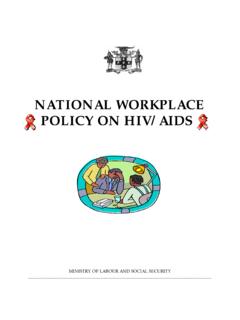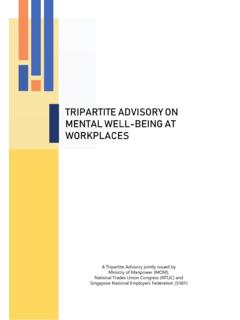Transcription of Psychosocial pathways and health outcomes: informing ...
1 Psychosocial pathways and health outcomes: informing action on health inequalities Psychosocial pathways and health outcomes: informing action on health inequalities 2 About Public health England Public health England exists to protect and improve the nation s health and wellbeing, and reduce health inequalities. We do this through world-class science, knowledge and intelligence, advocacy, partnerships and the delivery of specialist public health services. We are an executive agency of the Department of health , and are a distinct delivery organisation with operational autonomy to advise and support government, local authorities and the NHS in a professionally independent manner. Public health England Wellington House 133-155 Waterloo Road London SE1 8UG Tel: 020 7654 8000 Twitter: @PHE_uk Facebook: About the UCL Institute of health Equity The Institute of health Equity is led by Professor Sir Michael Marmot.
2 It seeks to increase health equity through action on the social determinants of health , specifically in four areas: influencing global, national and local policies ; advising on and learning from practice; building the evidence base; and capacity-building. The Institute builds on previous work to tackle inequalities in health led by Professor Sir Michael Marmot and his team, including the Commission on Social Determinants of health ; Fair Society, Healthy Lives (The Marmot Review) and the Review of Social Determinants of health and the health Divide for the WHO European Region. This report was prepared by Dr Ruth Bell at the UCL Institute of health Equity. The author is grateful to PHE, especially Jude Stansfield, to colleagues at IHE, especially Professor Sir Michael Marmot and Dr Jessica Allen, and to all those who took part in the consultations for their insightful comments during the development of the report.
3 Psychosocial pathways and health outcomes: informing action on health inequalities 3 Crown copyright 2017 You may re-use this information (excluding logos) free of charge in any format or medium, under the terms of the Open Government Licence To view this licence, visit OGL or email Where we have identified any third party copyright information you will need to obtain permission from the copyright holders concerned. Published September 2017 PHE publications PHE supports the UN gateway number: 2017209 Sustainable Development Goals Psychosocial pathways and health outcomes: informing action on health inequalities 4 Contents About Public health England 2 About the UCL Institute of health Equity 2 Executive summary 5 Introduction 111 The conceptual model 144 Psychosocial pathways and determinants of health 17 The wider context (macro level) 17 Position in society (social stratification) 18 Extent of exposures and vulnerabilities 19 Standard of living (material factors) 20 Protective and adverse factors for health 21 mental health and wellbeing 29 Bodily reactions to stress and other factors (psychobiological processes) 30 Personal actions and health behaviours 32 Implications for action 37 References 58 Psychosocial pathways and health outcomes.
4 informing action on health inequalities 5 Executive summary Unequal distribution of the social determinants of health , such as education, housing and employment, drives inequalities in physical and mental health . There is also extensive evidence that Psychosocial factors, such as work stress, influence health and wellbeing. The term Psychosocial relates to the way that social factors affect states of mind. [1, 2] This report highlights the current evidence that exists about the relationships between social determinants, Psychosocial factors and health outcomes. It also provides a conceptual framework that focuses on the Psychosocial pathways between factors associated with social, economic and environmental conditions, psychological and psychobiological processes, health behaviours and mental and physical health outcomes (summarised in Figure 1 below). Figure 1: Psychosocial pathway Key messages Psychosocial pathways help explain how social determinants shape health outcomes Psychosocial pathways are significant in mediating the effects of social determinants (social, environmental, economic, political and cultural factors) on health .
5 Yet despite their significance, these pathways are often not explicitly recognised as an important part of the framework of causes from social determinants to health outcomes. Psychosocial pathways need greater clarification and stronger recognition in policy and practice to reduce health inequalities. Social Stratification:Position in SocietyCommunity,neighbourhood, family, individual adverseand protective Psychosocial factors that impact onhow we think and feel (our sense of mental wellbeing)Standard of living(Materialfactors)How the Body ReactsDifferential Exposures and Childhood conditionsand experiences, Income, HousingMacrolevel: WiderContextDistribution of health ( mental and physical) health Related BehavioursPsychosocial pathways and health outcomes: informing action on health inequalities 6 Addressing social determinants is fundamental to tackling health inequalities The accumulation of positive and negative effects of social, economic and environmental conditions on health and wellbeing throughout life is largely responsible for inequalities in health .
6 Taking a social determinants of health approach to tackling health inequalities requires an understanding of the social, economic and environmental aspects of the context in which people live in order to develop policies and interventions that help to address the factors that shape physical and mental health and health behaviours. The significance of adversity and trauma Stressors, from daily frustrations and difficulties at home or at work to major traumatic events, affect everyone to a greater or lesser extent. Their combined effect on population mental and physical health and wellbeing is substantial. Stressors exert effects from early childhood, throughout life. It is important to take a life course perspective in considering the health effects of stressors. The importance of protective factors Individual characteristics such as control, self-efficacy and resilience, as well as the social characteristics described as social capital , such as social networks, can protect health from the effects of stressors in some circumstances; and thus positively influence health outcomes.
7 How Psychosocial pathways impact on health Psychosocial pathways directly impact on physical health outcomes. Stressors experienced repeatedly or over a long period of time, including stressful living and working conditions, are associated with high blood pressure, development of diabetes, and ischemic heart disease. Psychosocial pathways influence health -related behaviours, such as drinking alcohol, smoking, diet and physical activity. The relationship between social, economic and environmental contexts and health is complex and non-linear. Taking action The evidence suggests that Psychosocial pathways are important to health inequalities and should be explicitly considered in efforts to reduce these inequalities. It is important to ensure that Psychosocial pathways are addressed as part of action across the whole social determinants pathway : a longer term, preventive approach to address wider social determinants of health (the root causes of health inequalities, including Psychosocial pathways ), and interventions to address the effects of adverse factors and promote protective Psychosocial pathways and health outcomes: informing action on health inequalities 7 factors across the whole population at a scale and intensity that is proportionate to need, enabling people to have control over their lives and build social capital.
8 Local and national decision-makers are encouraged to consider this evidence and appropriate approaches to action. Potential implications for action include: 1. Addressing the wider determinants of health : a. Strategic and comprehensive approaches across the causal pathway : Improving the conditions in which people live and work, especially those experienced by the most disadvantaged groups, can reduce the stressors faced by the population, to improve health , prevent illness and reduce health inequalities. If not already doing so, local areas can apply the six Marmot principles within their strategic plans. This encourages stakeholders from different sectors to work together to ensure initiatives in one sector also support progress in others. Local authorities applying the Marmot principles can review progress periodically using relevant indicators, and make policy adjustments accordingly.
9 Local areas can ensure a comprehensive approach across the causal pathway , addressing wider determinants and Psychosocial factors to improve both physical and mental health and reduce health inequalities. b. health in All policies : Local areas can work with stakeholders to use a health in all policies approach to consider the impacts of policy and programmes on wider determinants, Psychosocial factors and pathways to health and health equity; frameworks such as the mental Wellbeing Impact Assessment Toolkit can help. 2. Addressing the effects of adverse factors and promoting protective factors among the whole population at a scale and intensity that is proportionate to need: a. Interventions early in the life course: Local action to improve early years experiences can address the causal pathway , including reducing child poverty, creating health -enhancing school and family environments, enabling resilient family relationships and good parenting and providing psychologically-informed support services.
10 Local areas can invest in approaches that tackle the traumatic effects of adverse childhood experiences head on, by enabling people to access support in a way that is acceptable to them. This can help improve mental health and wellbeing for those who have experienced trauma in childhood. By using tools such as REACh, local areas can help tackle the intergenerational effects of adverse childhood Psychosocial pathways and health outcomes: informing action on health inequalities 8 experiences. Local areas can help to prevent adversity in early life, including through existing safeguarding systems. b. School: Local areas can work with schools and colleges to apply policies and programmes that address the Psychosocial pathway by tackling adverse factors such bullying, stress and isolation, and promoting protective factors such as social networks, resilience, emotional wellbeing, social skills and social cohesion and sense of place and belonging.












